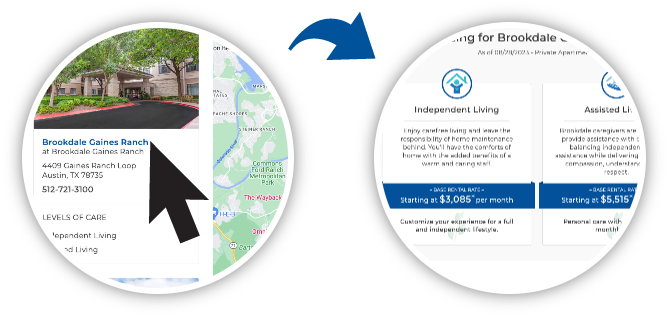- Home
- Healthcare Professional Referrals
- Blogs
- More than Memory Care: Lessons Learned From 40 Years of Providing Specialized Dementia Care
Alzheimer's & Dementia
December 5, 2022
More than Memory Care: Lessons Learned From 40 Years of Providing Specialized Dementia Care
Dementia is one of the most complex illnesses that can strike a human: It is cognitive; psychological; neurological; medical; socially complicated; and, at times, psychiatric in its symptomology. Much more than the loss of memory, this illness has come to be defined by symptoms of dementia woven into a multifaceted web of challenges best navigated with expert guidance.
The presence of a diagnosis of dementia almost guarantees that a family will need to interface with nearly every aspect of the healthcare system over the course of the illness. Care transitions between physicians’ offices, acute care centers, emergency departments, pharmacies, home health agencies and long-term care communities, and eventually hospice and palliative care organizations are consistently a part of living with dementia. People with Alzheimer’s or other dementias have more than twice as many hospital stays per year as other older people, and they also have more skilled nursing facility stays and home health care visits per year than other older people.
It has been well demonstrated that mitigating the symptoms of dementia and enhancing well-being for those diagnosed is achievable through non-pharmacological and often very low-tech methods. This work is largely comprised of bio-psycho-social-spiritual approaches, which have been perfected in the minds, hands and hearts of paraprofessional care partners and “soft scientist” dementia specialists. This may be why it has suffered from a lack of dissemination and legitimization in purely academic and evidence-based practices. We now know with certainty that it is not the locked doors themselves that provide the greatest benefit for those living in secured dementia care, but rather the intentional way life is organized and supported for the residents behind those doors. After years of honing the residential dementia care model, we understand that the real prescription — i.e., treatment — for persons living with dementia is to remain engaged in a life filled with purpose, meaning and deep connections to others.
Important elements for the resident living with dementia distilled in the best dementia care communities include, first and foremost, an authentic relationship with a consistently assigned dementia-competent care partner who understands the right communication approaches and who practices proactive consideration of unmet needs. Second, these elements include access to strength-based, individualized daily engagement in purposeful activity presented in a dignified manner, and preferably which includes tasks and roles that contribute to the greater good and to helping others. And finally, the important elements for the resident living with dementia include maintaining the freedom to continue to do and decide for oneself for as long as possible, including having safe access to a choice of spaces and environments — both indoors and out. These elements are setting-agnostic and should be viewed as the gold standard for supporting or “treating” anyone who is living with dementia.
Along with these standards, new technologies and products emerging in the dementia space are expanding the traditional definition of what constitutes a full life. The use of technology featuring Artificial Intelligence (AI) in particular shows promise, as it is now being incorporated into solutions to help detect falls, monitor whereabouts and biometric measures, and even provide person-centered engagement content. Specialized dementia care settings can and should lead the way in the development of best practices for facing the challenges of dementia. Integrating the latest evidence-based advances and new technologies with the time-honored gold standards of person-centered dementia care and programming has created new depths of understanding about the clinical management of dementia.
More than just “memory care,” today’s dementia care must embrace the complexity. We need to strive to continue to provide the needed services with our gold-standard, person-centered, strength-focused approach, while we build the necessary multifaceted care ecosystem of the future that will ultimately support the well-being of those living with dementia and the families who support them.
Categories
- Alzheimer's & Dementia
- Caregiver's Corner
- COVID-19
- Health, Safety and Wellness
- Financial Well-Being
- Passion & Purpose
- The Journey to Senior Living
- Trending Now
- Socialization & Relationships
- Brookdale Solutions
- Brookdale Vision and Growth
Archives
View All
- November 2025
- October 2025
- September 2025
- August 2025
- July 2025
- June 2025
- May 2025
- April 2025
- March 2025
- February 2025
- January 2025
- December 2024
X
Let us help find the right community for you!
Complete the form and a Senior Living Advisor will be in touch!


